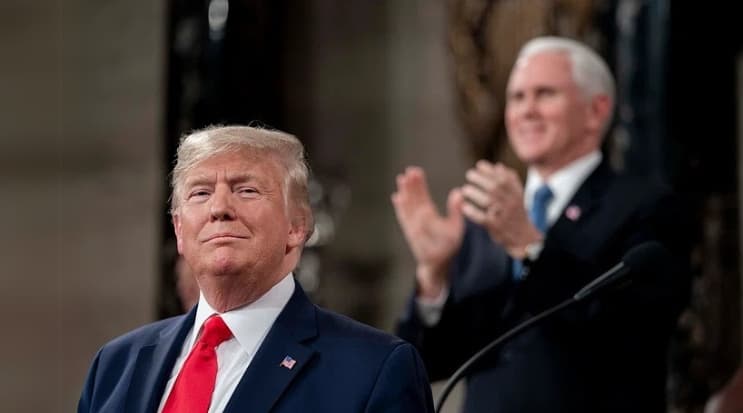
US President Donald Trump’s Middle East Tour: Strategic Partnerships and Key Deals on the Table
Trump visits Saudi Arabia, UAE, and Qatar in a high-stakes diplomatic tour to reinforce defense pacts, unlock massive investments, and navigate regional power dynamics.
US President Donald Trump’s first overseas trip of his second term has taken him to the economic and geopolitical heart of the Middle East. Visiting Saudi Arabia, the United Arab Emirates (UAE), and Qatar, the president is seeking to renew strategic alliances with these energy-rich Gulf nations. The tour underscores Washington’s intent to deepen cooperation on defense, energy security, and technological innovation. At the same time, Gulf states aim to position themselves as America's indispensable partners amid a shifting global order.
Saudi Arabia: Recalibrating Security Ties and Nuclear Ambitions
Saudi Arabia tops the agenda, with security guarantees and a long-delayed strategic pact back in focus. Riyadh has persistently pursued a formal US-Saudi defense agreement, previously held up due to Washington’s insistence on Israeli-Palestinian normalization. Now, with normalization sidelined, talks are reportedly back on track.
The Kingdom is also expected to revisit its controversial push for a civil nuclear program, including domestic uranium enrichment. While this could trigger proliferation concerns in the US and Israel, Saudi officials argue it’s vital for energy diversification under Vision 2030.
Further, Trump’s visit could catalyze significant economic pledges. Riyadh has announced intentions to expand US investments by at least $600 billion over the next four years. While Trump previously floated a $1 trillion figure, even partial realization would mark a significant influx into the US economy.
Still, tensions may surface over oil prices. Saudi Arabia seeks high prices to fund its diversification strategy, whereas Trump’s domestic policy favors cheaper energy to contain inflation and boost US manufacturing.
UAE: Banking on AI and Advanced Technologies
The UAE’s focus is squarely on technology. With a bold goal of becoming an AI superpower by 2031, the UAE is actively lobbying to ease US export restrictions on advanced semiconductors and AI chips—barriers tightened under the Biden administration.
Abu Dhabi recently unveiled a $1.4 trillion investment strategy spanning AI, semiconductors, green energy, and advanced manufacturing over the next decade. With $1 trillion already invested in the US, the UAE is pitching itself as “the capital of capital”—a trusted partner for American innovation.
Diplomatic sources suggest that the UAE will also seek new technology cooperation agreements, potentially involving joint research hubs and tech transfer frameworks. National security concerns in Washington may temper these ambitions, but Trump's transactional diplomacy could offer more room for negotiation.
Qatar: Diplomacy and Defense as Leverage
Qatar, already host to the region's most extensive US military base (Al Udeid Air Base), enters these talks from a position of strength. A recently renewed 10-year defense cooperation agreement and its designation as a Major Non-NATO Ally affirm its value to Washington.
But Doha’s strategic play extends beyond defense. Qatar has emerged as a crucial mediator in Middle East conflicts, from Gaza to Afghanistan and potentially Syria. The Gulf state is expected to lobby Trump's administration to relax Caesar Act sanctions on Syria, allowing Doha to engage more robustly with the Assad regime.
While the US has been cautious, Qatar’s mediation in hostage negotiations and humanitarian logistics has proven critical, giving it diplomatic leverage that few regional actors possess.
Gulf States’ Investment Diplomacy: Aligning with Trump’s Agenda
Quid pro quo engagements have long defined Trump's foreign policy, and the Gulf states have adapted accordingly. All three nations—Saudi Arabia, the UAE, and Qatar—are pledging massive investments in the US economy, alongside defense procurement deals likely to run into the tens of billions.
This investment-first diplomacy aligns with Trump’s “America First” agenda. In return, Gulf leaders seek deeper access to US markets, advanced defense platforms, and relaxed technology export controls. The transactional nature of these relationships makes them uniquely resilient to ideological shifts, offering predictability and mutual benefit.
The Bottom Line
Beyond bilateral gains, Trump’s Gulf tour carries broader implications for the region’s balance of power. With China and Russia expanding their influence in the Middle East, Washington is keen to retain strategic depth through its Gulf allies.
The Gulf states are recalibrating their foreign policy to hedge against multipolarity—engaging China on infrastructure, Russia on energy, and the US on defense and innovation. Trump’s return offers a window to rebalance that equation in Washington’s favor.
Furthermore, regional dynamics—particularly the Israel-Gaza conflict, Syria’s reintegration, and Iran’s nuclear ambitions—are adding urgency to these discussions. Trump’s meetings could reset the tone for US engagement in all three flashpoints.
Key Takeaways
-
Saudi Arabia seeks a formal US security pact and cooperation on a civilian nuclear program.
-
UAE pushes for eased AI export restrictions and increased tech-sector collaboration.
-
Qatar focuses on extending defense ties and diplomatic backing for Syria's engagement.
-
Massive investment commitments from all three Gulf states aim to reinforce US ties.
-
Oil pricing tensions may resurface, with diverging interests on energy policy.
-
Trump’s transactional diplomacy offers new avenues for deal-making.
-
Gulf states use strategic mediation and economic clout to remain indispensable US allies.
For any enquiries or information, contact info@thelawreporters.com or call us on +971 52 644 3004. Follow The Law Reporters on WhatsApp Channels